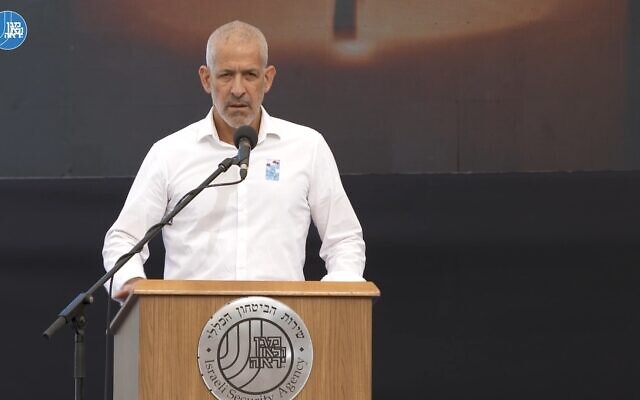Shin Bet chief in Washington for talks with US officials fearful of PA collapse
Ronen Bar slated to have meetings at CIA and White House, which also hosted top Netanyahu aides Thursday for talks on Iran, Russia and Ukraine, Palestinians
Jacob Magid is The Times of Israel's US bureau chief

The head of the Shin Bet security agency was in Washington on Thursday for meetings with senior American officials amid growing US concern over the security situation in the West Bank and the deterioration of the Palestinian Authority, an Israeli official said.
Ronen Bar’s meetings will include ones at the White House, the State Department and the CIA, the official said, confirming a report in the Axios news site.
The official did not specify whether Bar would be meeting with CIA chief William Burns, who has been closely involved in US efforts to stabilize the PA.
Also in Washington this week were Strategic Affairs Minister Ron Dermer and National Security Adviser Tzachi Hanegbi who held meetings with White House and State Department officials to discuss the Iranian nuclear threat and peace prospects with Saudi Arabia.
According to a brief White House statement on Thursday, Hanegbi and Dermer met with National Security Advisor Jake Sullivan earlier in the day for “continued discussions” on preventing Iran from acquiring a nuclear weapon, and “ways to counter threats from Iran and its proxies.” The trio also discussed shared US-Israel concerns with Russia’s “deepening military relationship with Iran, and the importance of supporting Ukraine in the defense of its territory and citizenry, including from Iranian drones.”
Sullivan reaffirmed the Biden administration’s commitment to “enhancing Israel’s security and economic integration throughout the Middle East,” and “stressed the need to take additional steps to improve the lives of Palestinians, critical to realizing a more peaceful, prosperous, and integrated region.”
In February, Burns depicted a bleak current state of affairs between Israel and the Palestinians, saying that the still-ongoing period of tensions between them was beginning to resemble the violence of the Second Intifada.
Presenting a more moderate approach to his Hamas rivals, Mahmoud Abbas’s PA has seen his popularity plummet in recent years amid the absence of a peace process. The PA has also long been plagued by allegations of corruption and Abbas’s refusal to hold elections since 2005 has further contributed to public mistrust.

Ties between Jerusalem and Ramallah have been strained for months. The previous Israeli government took some steps to bolster the PA, but still refused to engage in diplomatic negotiations. Tensions have soared since the swearing-in of a new coalition in late December led by Prime Minister Benjamin Netanyahu. Widely seen as the most right-wing government in Israel’s history, it slapped a series of sanctions against the PA in early January in response to the latter’s successful initiative at the United Nations to have the International Court of Justice weigh in on Israel’s conduct in the territories.
In late January, the IDF conducted a raid in the northern West Bank city of Jenin during which nine Palestinians were killed, including one civilian. Israel defended the operation as a necessary anti-terror measure. The PA responded by announcing the severing of its security coordination with the IDF (though Abbas later told Burns ties were only partially cut).
Still, the West Bank has remained on edge for well over a year as the PA has lost significant control over large swaths of territory and armed Palestinian groups have worked to fill the vacuum, with an uptick in attacks targeting Israeli civilians and military troops.
Since the beginning of the year, Palestinian attacks in Israel and the West Bank have killed 20 people and left several more seriously hurt.
Convinced that the PA is unable to clamp down on such terror groups, the IDF has carried out frequent nightly raids, particularly in the northern West Bank, which have often turned deadly.
At least 114 West Bank Palestinians have been killed in 2023 — most of them during clashes with security forces, but some were uninvolved civilians or were killed under circumstances that are still being investigated.









